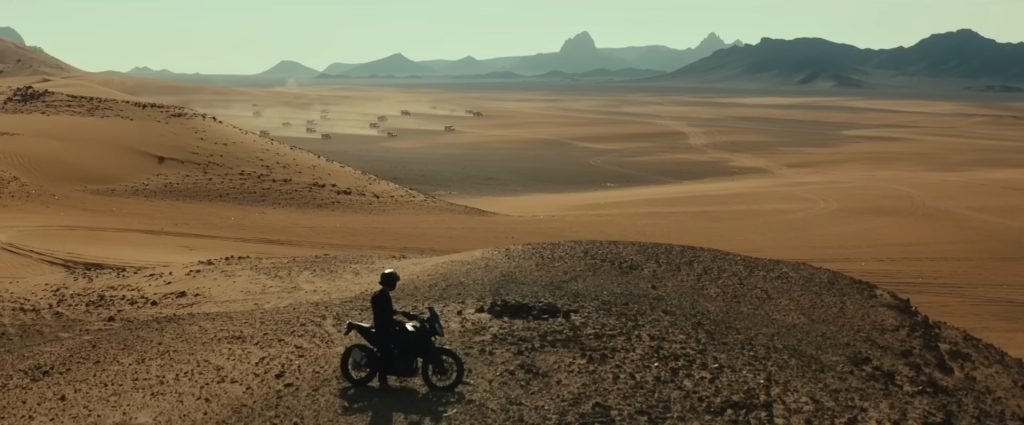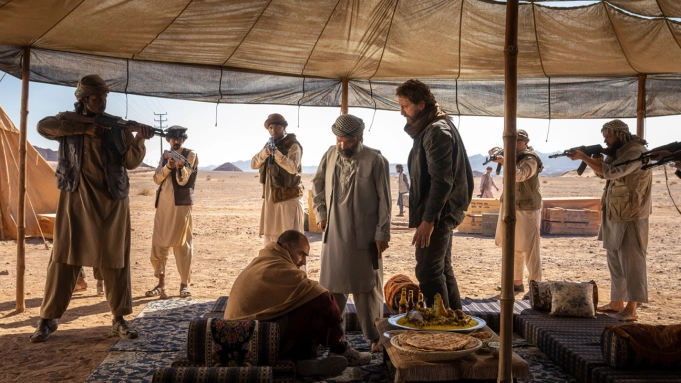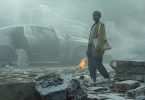Director Ric Roman Waugh and Gerard Butler are quite the pair, having worked together on both action thrillers Angel Has Fallen and Greenland. Their newest collaboration is Kandahar, an action spy thriller set across the Middle East starring Butler as a CIA operative who has his cover blown, and he must escape the country alongside his Afghan interpreter Mo, played by Navid Negahban, before they are caught by any number of opposing forces.
I spoke exclusively with director Ric Roman Waugh to talk about Kandahar. We discuss filming in the Middle East, how he captures action sequences, and his thoughts on twin films.
How are you doing, Ric?
Ric Roman Waugh: Doing good. It’s been a great long journey on Kandahar. Mounting this picture in Saudi Arabia, which was the first major Hollywood motion picture done in the kingdom since Lawrence of Arabia. In the middle of COVID, mind you, so it’s been a big undertaking, but I’m really proud of it and proud of all the people that came there to make this. And hopefully bring something where people want to get back into the movie theaters and have a great two hours and a big action ride, but also a movie that kind of can open them up to a different point of view, the way of the Middle East, the way Sicario kind of opened us up to what the war on drugs is really about on both sides of the border.

Definitely. Coming into this film, your last film was National Champions, which was a sports drama. And it was your first sports drama, your first venture outside, the action/crime/thriller genre. Did you feel like it was necessary to take a step back away from the action genre and do this other film and get a fresh perspective? And then what did you take away from doing that film and then coming back to this action genre?
Waugh: Well, I love the question, Matt. I think for me, it’s really about point of view. So when I read material or somebody tells me something like, for example, have there been a lot of comet movies? Yeah, tons of them. But the point of view of Greenland, that script just really struck a chord with me because it was an intimate portrayal of a family stuck in a global disaster. So it was the inside out version and National Champions, to me I just love the controversy of it. What it had to say of “I don’t know how to fix what’s going on the NCAA, but when you have $18 billion a year being made, you know, and you can’t even give these kids health insurance when they get injured, you know, something’s wrong there.” So how about we have a fun ride with some twists and turns and great characters and an inside look of what would be like 24 hours out from the national championship game. And hopefully, you have this exciting ride come out the other end and have a debate, right? My movies, I never try to give my opinion. They’re much more about just here’s the subject matter, words and all. You decide for yourself. It’s what we wanted with Kandahar.
Kandahar wanted to be this really cool movie set in the spy game of the modern day era of when the war is over, and everybody still making the land grab for Afghanistan. And then hopefully you have a better understanding of what it is in the Middle East, and who the characters are, and the people that aren’t a part of the policy makers and part of the politics but they’re just the people on the ground that are sent to enforce policy. But they’re just trying to get home to their families like we are.
What kind of research did you do in trying to get the most accurate portrayal of Kandahar and the Middle East?
Waugh: Well it all starts with Mitchell LaFortune, the writer who did four tours in Afghanistan and was in the Defense Intelligence Agency. He had a very strong grasp, first hand grasp, of this world and who the players are and the spy world. But also we brought in a Delta Force operator. We had British SAS there as well. So we had enough technical experts to really not only give us the expertise and the technology but also the characters themselves, right? The mentality of each faction. How they vary from one another. How somebody could be your ally today and your adversary tomorrow. So luckily I had all these great players with me to help me through that.
What I kind of really focused my efforts on was seeing the culture clash going on in the Middle East right now where you have the ultra conservative movement that’s been there for hundreds of years. They don’t want anything to change but work, pray, and sleep because they’re very devout. And you have a new generation that really want more than that. They want culture, and they want more integration into the western world, into the free modern world. That is very evident what’s going on in Saudi Arabia. And I think that also helped manifest itself onto the screen with these characters, where you see a Pakistani ISA operator who is meeting with the Taliban leadership and he’s in traditional wardrobe and clothes, and then he walks out and puts on Gucci sunglasses, smoking a vape pen listening to hip-hop and that’s not a caricature. That’s what’s really going on there.

One of my favorite moments in the film is the whole nighttime helicopter action sequence. I thought that was really well done, really well shot and just very intense. Can you walk me through what it was like filming that action scene? You have the nighttime, you have helicopters, you have these different night vision point of views that you’re doing. Bringing that all together, what was that process like?
Waugh: One, it was highly dangerous what we were doing because working with a helicopter at night at those low altitudes where you’re basically skimming the deck of the desert in the middle of massive rocks, people around and so forth, you really have to know what you’re doing. Luckily we had Fred North as our helicopter pilot. He’s the best stunt pilot in the world. But it was also a fun way to not only use technology to its advantage – our theme was creating Jaws in the sky. The way that we all went through Jaws, and it wasn’t just when our legs were dangling in the water and we could see the shark. It was when we couldn’t see the shark that scared us. So we wanted to use the nighttime to our advantage but also the modern day technology to allow you to see the shark but also what the desert looked at at night, maybe in black and white using fusion technology, which Gerard Butler’s character uses, which is infrared and thermal put together and you can change the color pattern. So we got to be Ansel Adams at night and show the landscapes in a different way. So it was juxtaposing all those different mediums together to hopefully convey a real anxiety driven sequence.
Are you familiar with twin films?
Waugh: I’m not.
So it’s when two films come out near the same time that are almost similar. Some examples are Volcano and Dante’s Peak coming out at the same time. Deep impact and Armageddon is another one. Last month, we had Guy Ritchie’s The Covenant came out, which kind of has very similar themes and where it’s the Afghan war and it’s this soldier and his translator who are trying to get out of the country. So I’m just curious to hear your thoughts. Are you aware of these things? I know it’s up to the studios on release dates and stuff but do you find it funny or do you find it interesting at all about this whole film landscape and these two similar movies coming out at the same time?
Waugh: Yeah, I’m definitely aware of it, but there’s different versions of that. So knowing in the studio system, and I’ve been a writer on some of those where you have competing projects, like you’re saying, and we’re all aware of it. So the horse race starts, right? Who’s gonna get out first and beating each other out of the gates? This was a very different thing that happened. We started way, way before The Covenant because we had gone in 2020 to start pre-production and then when the delta variant swept through Europe, we had to shut down and then have to remap the picture back again in ’21. It wasn’t honestly until about three months ago that I even knew about The Covenant because I think it kind of snuck under the radar. There was another movie I think Guy Ritchie was going to originally do and then he read the script and went and did it and they got it out faster than us. We were always coming out Memorial Day weekend.
So this is one of those misnomers where it could look like we knew of each other and we were competing for that horse race. This just happened to be that fluke circumstance, where we didn’t know. I imagine they knew about us, right? We’d been in the ether for quite a while of mounting a picture in Saudi Arabia the first time. That’s no easy feat. But you’re right, we do live in a day and age where suddenly the great idea comes out and then there’s two or three pictures all trying to vie for that spot. That definitely happens, and it’s frustrating because it pits the filmmakers against one another. We’re a piece of commerce than really doing what you want to do.
Kandahar is now playing in theaters nationwide.







